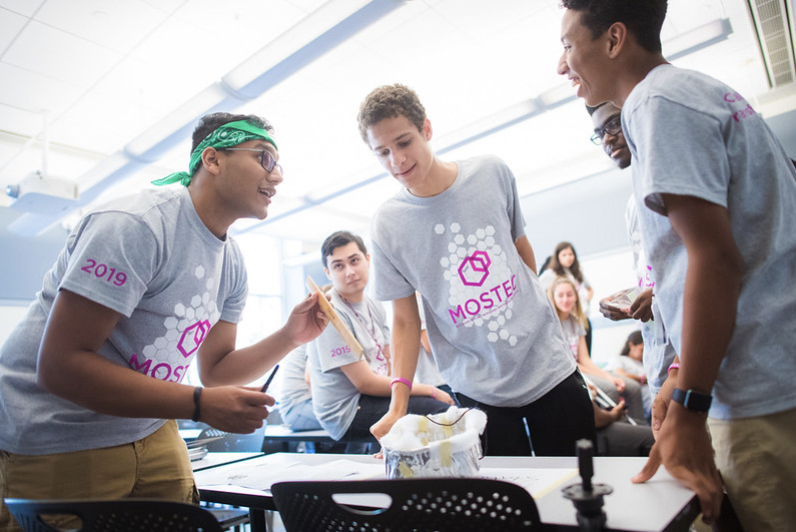
Har Patel, MOSTEC ’16 alum and Philadelphia native, is the recipient of the MOSTEC 2019 Hexagon Award for Outstanding Online Facilitator (OF). He was one of 11 OFs serving 137 MOSTEC scholars in 2019. Har is a third-year, pre-junior student at Drexel University, pursuing a degree in Electrical and Computer Engineering with a minor in Business. He is developing mentorship skills through his work as a MOSTEC OF and cluster leader, and as part of the STEM Retention Peer Mentoring program at Drexel. He enjoys developing electrical engineering solutions and participating in hackathons across the country.
It’s been several weeks since the MOSTEC 2019 program ended, but I still meet with my students every Sunday night to talk about college applications, acceptance letters, and to catch up on weekly accomplishments. When I was a MOSTEC scholar in 2016, having an OF really helped in my college search process. They supported me when I didn’t get the results I wanted, and to this day, I still ask my OF for advice about school and even general life. I wanted to give back to the MOSTEC community and be that mentor for students who were as curious as I was when I was in their shoes.
I also wanted to give back because when I was a MOSTEC student, the program really opened my eyes to learning there were many students around the country who were just like me and wanted to do a lot more. Most of the people in my high school didn’t have my same aspirations or any background that I come from. I’m the first person in my family to go to college, and I was one of the only kids in my high school that really had that story.
In my introduction blog during the Academic phase I told students I would be available to help with Electrical Engineering and Computer Science (EECS) coursework, because I took that class when I was in MOSTEC and I’m familiar with the Raspberry Pi kits and Python software. Students attended synchronous, discussion-based courses, and we used the MOSTEC website, email, blog posts, Webex, and messaging platforms like Discord to communicate and work together. When students had an EECS question, I’d ask them to send me a picture of their breadboards and their code via email, or we’d talk directly via Webex call.
MOSTEC does a great job at building a community of STEM-loving individuals. We had “MOSTEC Madness” game nights and online talent shows, we discussed SAT subjects and debated whether pineapple should be allowed on pizzas. We built collaborative lists for everything from college scholarships to packing for the MOSTEC Conference. By the time everyone flew into MIT for the Conference, the sense of community was already there. It was a really cool feeling like we had built a big family.
The Conference is always the best part of MOSTEC. One of my favorite parts was meeting the students in person. I will never forget seeing so many kids enthusiastic about science and engineering, all coming together.
During our four days together at MIT, the OF team worked with instructors to help students push through last-minute hurdles to finish their projects before the Symposium. One of our student’s project got unsoldered on the day of the Symposium right before he was going to present – we ran to the lab and tried soldering it again, and it didn’t work, so we helped him adjust his presentation to show the prototype and the video of how it worked. He was able to pull through it and not be too upset.
After the Conference we moved into a three-month long Enrichment phase, where we focus on college preparation and career exploration topics. Students got tips on writing essays from MIT Admissions, and advice on how to select recommenders from Cornell University staff. We also heard stories from professionals like rocket scientist Myron Fletcher who shared their journeys in science and engineering.
As OFs we shared tips on how to apply and get involved in college, offered feedback on essays and helped with mock interviews to get students familiarized with the college application process. I had been encouraging my students to think about the colleges and programs they liked, and then shared the same college tracker that I used in MOSTEC ‘16 to help them stay on top of deadlines. I also made a Google Drive folder for each of my students to keep all their application materials organized. We discussed college fly-in programs, and got started on early applications.
Inspired by our program facilitator, I started doing individual online check-ins with my students before big deadlines. I did one check-in before the Conference to make sure everyone was packed and ready, and another in November to check how early applications went. We had a final check in right after MOSTEC ended to make sure students’ January applications were going to get done in time. I still meet with my students every week, and I’m planning on meeting with them until all of them graduate.